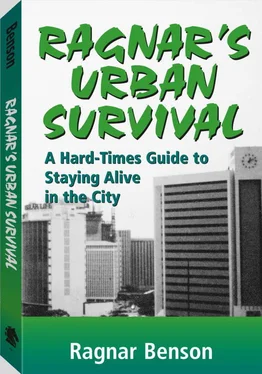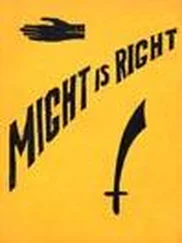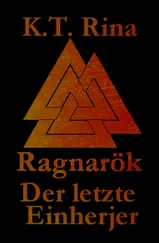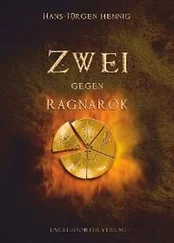At this writing absolutely everything worldwide is denominated in U.S. dollars. Oil, refinery products, computers, wheat, corn, gold, precious and nonprecious metals, iron, steel. cocoa, lumber, cases of tomatoes, melons, tobacco, and even a night with a woman. I can’t think of anything not denominated and traded worldwide in dollars. As a practical matter, if there were no U.S. dollars we would have to invent them!
Dollars are even being sent rather than food to refugees in ravaged, war-torn areas. It’s the trendy new way of arranging for food aid. Dollars in refugees’ hands, we have found, encourage the inflow of food by private shippers and producers from hundreds of miles away As prices go up, local farmers are encouraged to plant more. Aid organizations sending food shipments into an area discourage farmers by lowering prices in their markets. When it’s done by government agents, it is always handled in a corrupt and inefficient manner. Money gets the economy running again, whereas actual bags of foodstuffs depress it.
The bottom line—especially for city survivors who will be close to quantities of goods and services—is that storing lots of cash has the potential to overcome great deficiencies in one’s survival plan. However, gold—including gold coins—is a poor trade good.
Cuba’s economy has been in a state of collapse since the demise of the Soviet Union in 1991 when all Soviet aid to Cuba was halted. I have been there twice since that time. Under-the-counter barter in the tightly knit Cuban society keeps its economy afloat, but this is barter of my two chickens for your cabbage and dozen eggs, or my skill and labor to repair your Soviet-built motorcycle in exchange for your sugar ration. While there I traded extensively in the underground economy using dollars, but never for gold coins. They wouldn’t have known what to do with gold: gold of any kind had absolutely no practical value to Cubans. It was much the same in East Berlin before the wall came down. Mexicans are in the same boat. Their economy has been devastated by recent massive peso devaluations and they want gringo dollars, not gold coins.
Gold coins are somewhat similar to the piano my dad’s family traded for three sacks of potatoes. Apparently the only reason this deal was finally consummated was out of some sort of perverse sense of humor on the owner’s part. Like the piano, gold packs too much value into too little space for owners ever to realize its full potential. It won’t do to trade the piano one piece at a time.
Gold coin does meet the survivor’s Rule of Portability, but other trade goods do this job better. On the other end of the trade spectrum, small gold coins are also difficult to handle. Teensy, tiny $1 and $5 gold pieces might even blow away in the wind! Our current experience indicates that gold is not a good exchange medium in a primitive survival economy.
Portability, practicality, and profitability are the three P’s of trade goods. Profitability has to do with things that are used as tools to create wealth. In most cases, wealth for city survivors is food, water, and shelter. What items should be stocked as trade goods? They have to be consumables!
This fact was reinforced again with visits to Cuba and Britain. Cuban cigar rollers still work on a piece basis. In very un-communist fashion, they are paid by performance the same as any other entrepreneur. Experienced cigar rollers are the best-paid laborers on the island. What did these top-of-the-line laborers want to trade from me? Not gold coins, not CD/tape players, not my watch, or anything else so exotic. It was common, dull, average things like bars of soap and aspirin tablets.
This is similar to what happens to me in Britain. On hearing my American accent, Brits around often position themselves so it is possible to quietly ask if I have any pistol ammunition I wish to trade!
Consumable items such as ammunition, soap, film, medicine, toothpaste, toilet paper, shoes, underwear, aspirin, pens, pencils, paper (I was continually asked for these last simple little items in Cuba), cooking oil, salt, wire, wire snares, computer disks, nitrogen fertilizer, blasting caps, gloves, tape, knives, sharpening stones, matches, saws, files, chain saw parts, light bulbs, garden hose, motor oil, engine filters, powder, primers, bullets, canning lids, plastic freezer bags, electrical supplies, nylon rope, coffee, welding rod, batteries, lamp mantles, LP gas, flour, yeast, detergent, needles and thread, tape, bleach, Toothbrushes, antacid, sugar, steel wool, calcium hypochlorite (used to home-manufacture bleach), nails, screws. bolts, flashlights, batteries, bulbs and repair parts, tires, pepper, boot oil, and shoelaces all have potential as city survival trade goods.
It’s very sobering to contemplate, but apparently the higher the casualty rates among fellow residents, the more these items will be scrounged up and put on the market. There were, for instance, so many German casualties at Stalingrad that hordes of Soviet soldiers enjoyed adequate supplies of captured boots and coats when the shooting died down—some for the first time since they had been in the army
The importance of simple flashlights in a collapsed city economy is easily overlooked. There are never enough of these. Flashlights and batteries were the principal items we used in our little company store to manipulate the economy of some rural African communities in which I worked. In a few cases we charged up to a full day’s wages for a new set of flashlight batteries. The principle employed here may be identical to those we will likely encounter in city survival situations. Africans in the area were happy to work, but could see no reason to work. There were no stores in which they could spend wage money By opening a company store and carefully orchestrating prices and availability of some especially desirable items, we were able to both get our work accomplished and provide a benefit to our workers.
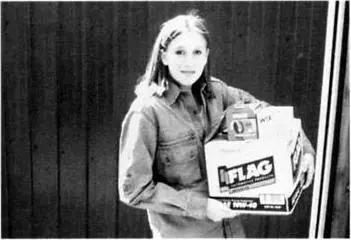
Consumables make excellent trade items in collapsed economies.
In many regards it was similar to our own society. (Except here it’s the politicians’ running the government store that forcibly takes away our money in the form of taxes to finance showy, make-work projects.) Placing money on a cord to wear around their necks as a means of ornamentation was common among rural Africans. This was of little economic benefit to the Africans. Providing flashlights, bulbs, and batteries they desperately needed was a benefit. It was never mandatory that they buy from us. When other stores opened we closed ours. Money is money and is always fungible.
Obviously the above list is at least 5,000 items fewer than complete. All of these items share the characteristic of being small, portable, somewhat durable, and almost essential in many circumstances. They are also all consumables. The only variation is that some of the desirable items are capital goods or tools—as things with which to make other things are called.
These are my favorite trade goods. Based on past experience, especially in large cities, I like ammunition, matches, and flashlights and batteries. Thirty years ago, for example, I purchased 1 million rounds of ammunition from Interarmco in Alexandria, Virginia. The cost was 2 cents per round. On the way home I was really concerned. What were we going to do with all this 8mm Lebel, 8 x 57mm and 7 x 57mm Mauser, .303 British, and other assorted pistol ammo? Not to worry, the boss advised. Unlike firearms, which are not generally consumed, ammunition is used up in large quantities. Guns that use this stuff will probably still be here in 50 years, but ammunition supplies are always shrinking. He was right. We put a price of 8 to 10 cents per round on the ammo. In 6 weeks enough was sold to pay for the entire original purchase. The last 80 percent was profit.
Читать дальше
